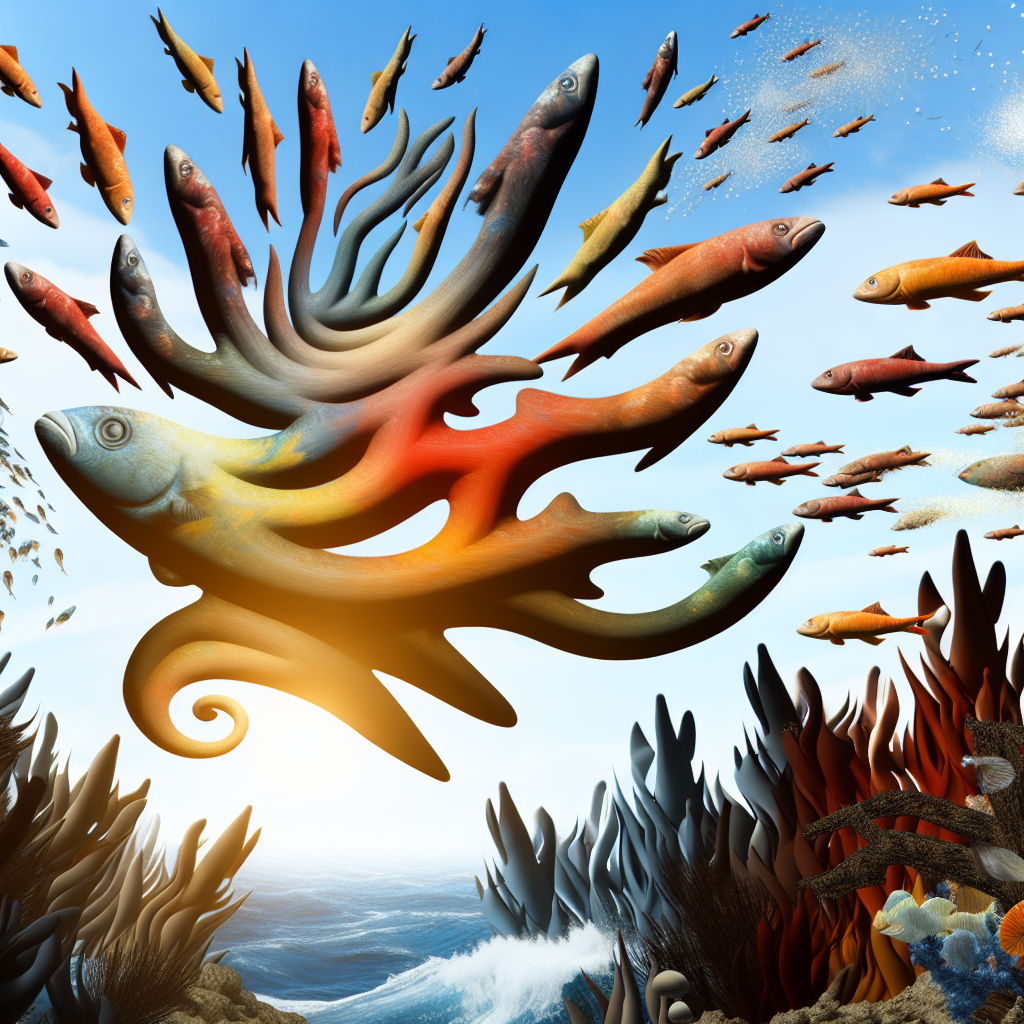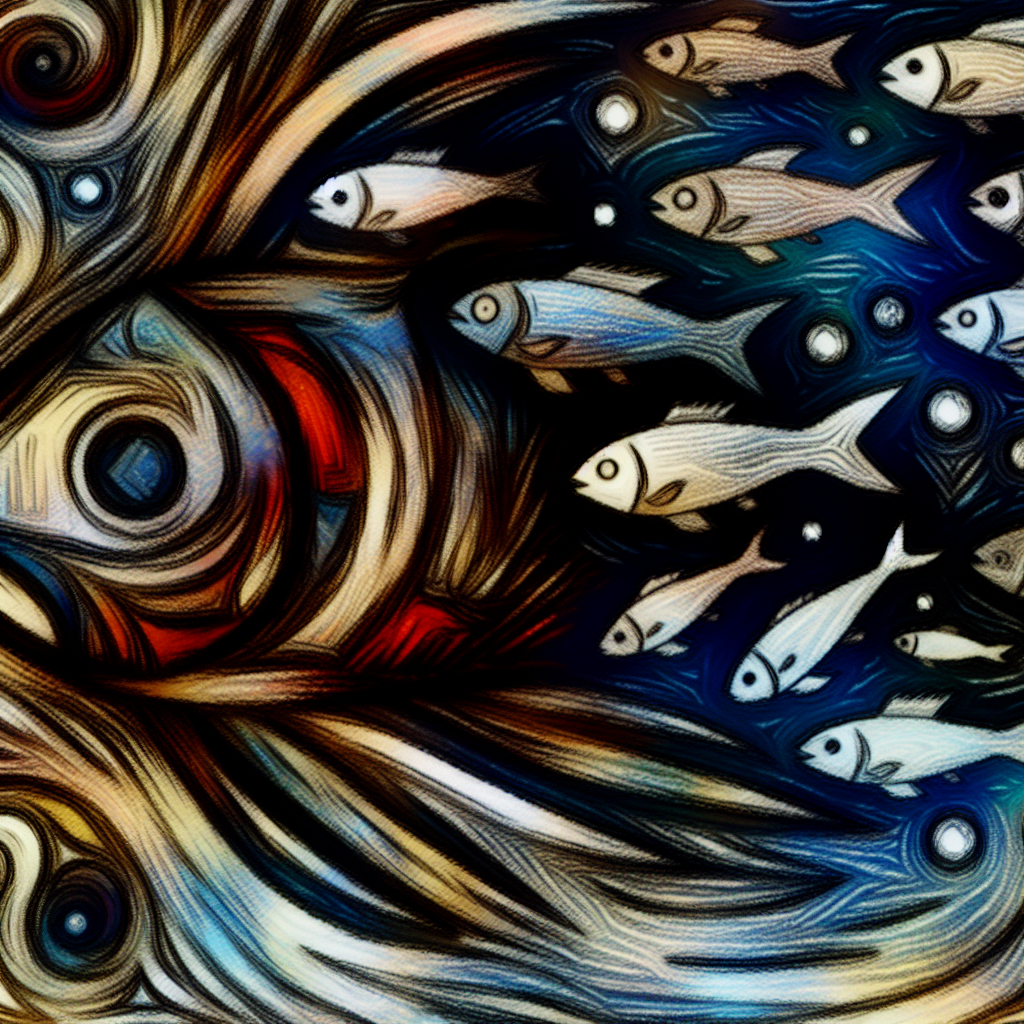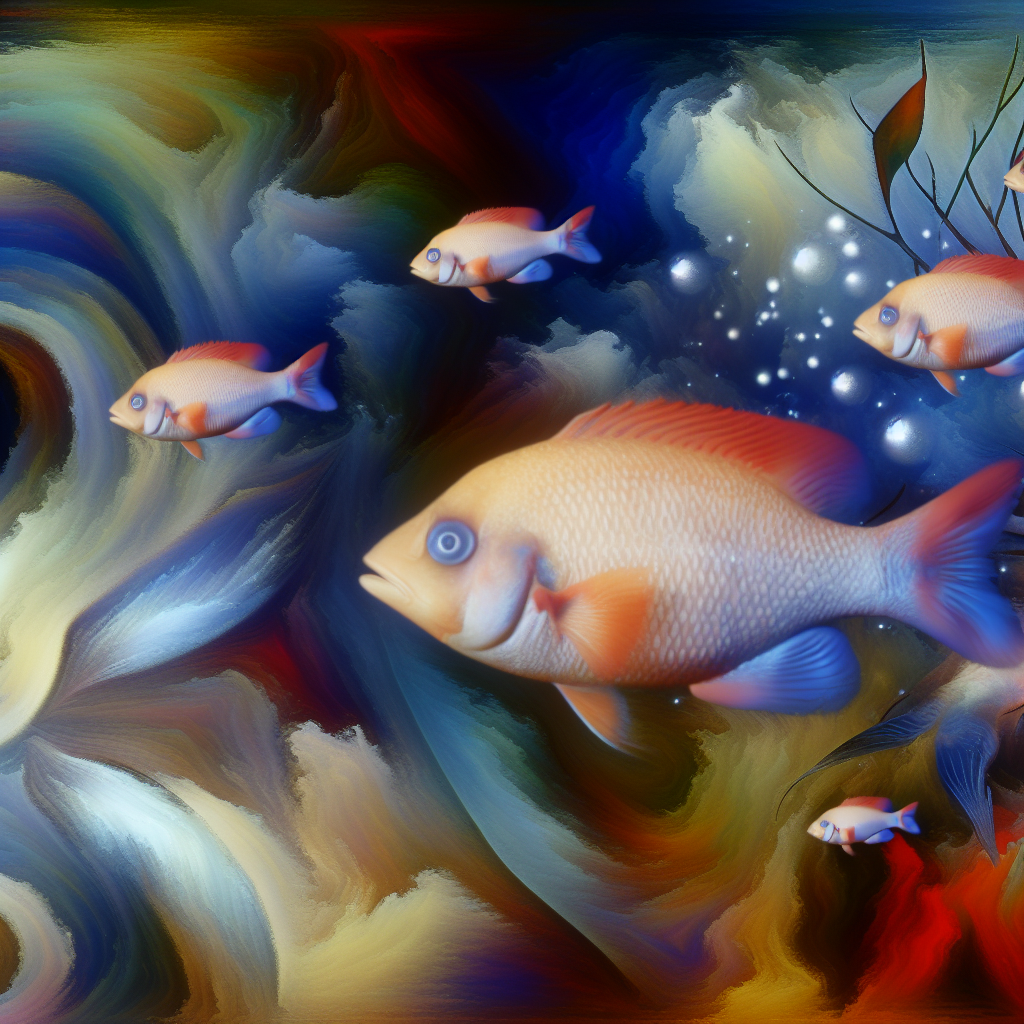
Understanding the Dream of Not Catching Fish: Symbolism and Insights
The Symbolism Behind Not Catching Fish in Dreams
Dreaming of not catching fish can evoke feelings of disappointment and frustration. This dream often mirrors our waking life experiences, particularly those where we feel we are making efforts but not achieving the desired outcomes. In various cultures and psychological frameworks, fish represent our emotions, aspirations, and even our deepest fears.
This article will explore the rich tapestry of meanings behind this dream, drawing from Ibn Sirin's interpretations, modern psychological insights, and cultural references to provide a holistic understanding. By reflecting on these interpretations, readers can foster personal growth, healing, and a deeper connection with their subconscious mind.
Dream Interpretation - Talk to me!

📱 Bestie+ App is Here!
Experience personalized dream interpretations, save your dreams, and share them with your loved ones! Available now on iOS and coming soon on Android.
- Dreaming of not catching fish may symbolize feelings of inadequacy or missed opportunities.
- The water in the dream often reflects the dreamer's emotional state.
- Combining traditional interpretations with modern psychology enhances understanding of dreams.
- Reflection on such dreams can lead to personal growth and healing.

Common Scenarios: Exploring the Depth of Your Fishing Dreams
- You are fishing in a lake but repeatedly find your hook empty.
This scenario symbolizes feelings of unfulfilled potential and disappointment in personal or professional pursuits. It reflects a sense of effort without reward, prompting reflection on areas where you may feel underappreciated or unsuccessful.
- You see fish swimming around but cannot catch any.
This scenario indicates that opportunities are present in your life, yet you may feel disconnected from them. It suggests a lack of confidence in pursuing your aspirations, urging you to confront self-doubt and take proactive steps toward your goals.
- You attempt to cast your line but it keeps tangling.
In this dream, the tangled line reflects feelings of confusion or overwhelm in your waking life. It suggests that external pressures may be hindering your ability to pursue goals, highlighting the need to untangle complexities before moving forward.
- You are surrounded by other successful anglers while you struggle.
This dream scenario speaks to feelings of inadequacy and comparison. It indicates a fear of not measuring up, urging you to acknowledge your unique journey rather than judging your progress against others.
- You catch a fish but it slips back into the water.
Here, the dream suggests that you might have fleeting success or unexpected setbacks. It symbolizes the need to hold onto opportunities and ensure you have the necessary resources and support to sustain your achievements.
- You go fishing but forget your fishing gear.
Forgetting your gear represents feeling unprepared or ill-equipped to handle life's challenges. This scenario encourages reflection on your readiness to pursue goals and confront fears associated with failure.
- You fish in murky water and can't see anything.
This dream highlights emotional uncertainty and a lack of clarity in your life. It suggests you may need to delve deeper into your emotions to uncover what may be holding you back from success.
- You find an old fishing spot but it no longer yields fish.
This scenario reflects nostalgia and the realization that some past endeavors may no longer serve you. It indicates a need for adaptability and the importance of evolving your aspirations to align with your current self.
Navigating the Waters of Self-Discovery Through Dreams
Dreaming of not catching fish encapsulates a profound emotional journey. It serves as a reminder that failure is a part of life’s intricate tapestry, often leading to deeper self-understanding and personal growth. By exploring the various dimensions of this dream—its symbolic meanings, cultural significance, and psychological underpinnings—individuals can glean valuable insights into their emotional landscapes and aspirations.
This exploration encourages a proactive approach to overcoming challenges and embracing opportunities for healing and self-discovery. Ultimately, such dreams can guide us toward reflecting on our desires, reconnecting with our emotional selves, and cultivating a more fulfilling life.
Psychological Dimensions: Why We Dream of Not Catching Fish
From a psychological perspective, dreams are a window into our subconscious thoughts and feelings. Sigmund Freud posited that dreams manifest repressed desires, while Carl Jung viewed them as a means of accessing personal and collective unconsciousness. In the context of not catching fish, Freud might interpret it as a reflection of unfulfilled sexual or emotional desires, whereas Jung might suggest it highlights unresolved conflicts within the dreamer's psyche.
Modern psychology reinforces the idea that dream content can signal areas of personal struggle or growth. The act of fishing is metaphorical for pursuing goals, so dreams of not catching fish may resonate with a fear of failure or feelings of powerlessness. This dream can also represent an internal dialogue about self-worth; the dreamer might be grappling with external expectations and their own perceived inadequacies, which can lead to anxiety and self-doubt.
Furthermore, dream analysis via cognitive behavioral therapy emphasizes the importance of re-evaluating such emotional responses. Recognizing patterns that emerge in these dreams can encourage individuals to confront fears, fostering resilience and personal development. Engaging in this self-reflection can lead to actionable steps in waking life, allowing the dreamer to shift their mindset and approach toward challenges and opportunities.
By processing these dreams, individuals can unveil deeper truths about their aspirations, emotional health, and interpersonal relationships.
Scientific Insights: The Nature of Dreams
Research by experts in the field of sleep studies, such as Matthew Walker, emphasizes that dreams play a crucial role in emotional processing and memory retention. In his book 'Why We Sleep', Walker notes that dreaming helps us navigate complex emotions and make sense of our experiences. This scientific framework aligns with the symbolism of not catching fish, as it reflects emotional struggles or unresolved conflicts that require attention in waking life.
Moreover, studies have shown that engaging with our dreams can lead to improved emotional regulation and resilience. A study conducted by the University of California found that individuals who reflect on their dreams report higher levels of psychological well-being and self-awareness. This highlights the importance of not dismissing dreams like those of not catching fish, as they provide valuable insights into our psyche and can foster personal growth and healing.
Cultural Insights: Fishing Dreams Across Societies
In many cultures, dreams of fishing hold significant meaning tied to societal beliefs about success and fulfillment. In Native American cultures, for instance, fish often symbolize abundance and emotional healing, suggesting that dreams involving fish can reflect one’s connection to ancestral wisdom and natural cycles. Conversely, failing to catch fish may indicate a disruption in this relationship, hinting at the importance of reconnecting with one’s roots and the natural flow of life.
In Western contexts, fish often represent various aspects of life such as health, wealth, and personal growth. Dreams of unsuccessful fishing attempts may resonate with the American ethos of 'the pursuit of happiness,' reflecting contemporary struggles with societal expectations and the pressure to succeed. This societal perspective can amplify feelings of inadequacy or the sense of losing touch with personal aspirations.
Furthermore, cultural narratives surrounding fishing, such as stories of legendary fishermen or folklore about the ocean’s bounty, can deeply influence how individuals interpret their dreams. Engaging with these cultural dimensions encourages dreamers to reflect on their standing within their community and the collective dreams and aspirations shared by society. In addition, in many spiritual practices, fishing is aligned with spiritual manifestation and the pursuit of enlightenment.
The inability to catch fish can indicate a need for deeper spiritual introspection, suggesting that the dreamer may be overlooking important signs and opportunities. This cultural lens underscores the idea that dreams are not only personal reflections but also communal narratives that connect individuals to larger societal themes.
Expert Perspectives: Understanding Dream Dynamics
According to Dr. Judith Orloff, a renowned psychiatrist and dream expert, 'Dreams are the bridge to our subconscious, revealing our deepest fears and hopes.' This underscores the transformative potential of exploring dreams like not catching fish. In her research, Orloff reveals that such dreams often highlight our emotional landscapes and can guide us in making conscious choices in our lives. Additionally, cultural psychologist Dr. Robert Johnson asserts, 'Fishing can symbolize the pursuit of the soul’s desires; failing to catch fish may indicate that these desires are yet to be fulfilled, prompting a deeper exploration of self.' This insight encourages individuals to look beyond the surface-level disappointment, embracing their dreams as a vital part of their personal journey.
The Silver Lining: Positive Interpretations of Fishing Dreams
Dreaming of not catching fish can ultimately foster personal growth and resilience. While at first glance it may seem discouraging, such dreams can serve as powerful catalysts for self-reflection. The experience of not achieving success in catching fish might encourage individuals to rethink their strategies and approaches to life's challenges.
Moreover, it can symbolize a need for patience and the understanding that success sometimes requires multiple attempts. This dream can remind us that failure is a natural part of the journey toward our goals, instilling a sense of perseverance and determination. Embracing this viewpoint may empower individuals to embrace setbacks as opportunities for learning and growth, turning disappointment into a motivational force.
Additionally, these dreams may prompt a re-evaluation of what true fulfillment means for the dreamer. They can inspire the individual to reconnect with their authentic self, reassessing their goals in light of their values and desires. Ultimately, the journey of self-discovery can be enriched by examining the layers of meaning behind such dreams, opening pathways to personal transformation and emotional healing.
The Deep Waters of Meaning: Understanding Fish Dreams
Ibn Sirin's 'The Great Book of Dreams' posits that fish symbolize wealth, fertility, and the subconscious mind. When one dreams of not catching fish, it can signify feelings of inadequacy or unmet desires. This reflects a struggle to grasp opportunities that may seem just out of reach, akin to a fisherman pulling up an empty net after hours at sea.
In a broader context, fish swimming freely represents potential and aspiration, while the act of not catching them can denote emotional blockages or a disconnect from one's goals. Moreover, water is often associated with emotions in dream analysis. Hence, a dream about failing to catch fish might symbolize turbulent feelings or unresolved issues that require attention.
The larger context of the dreamer’s life can offer further insights; for instance, it may suggest a fear of failure or a lack of confidence in one's abilities to manifest desires. Interpreting such dreams encourages individuals to evaluate their emotional landscape, pressures in personal or professional life, and any existing fears that may hinder growth. This symbolic reflection invites the dreamer to navigate the waters of their emotional being, potentially leading them to uncover hidden truths about their aspirations and self-worth.
Cautionary Tales: Negative Interpretations of Fishing Dreams
While not catching fish in dreams may lead to personal growth, it can also signify underlying anxieties and feelings of inadequacy. This dream might reflect a fear of failure, where the dreamer feels unprepared or incapable of achieving their goals. This sentiment can amplify feelings of discouragement, potentially leading to avoidance of challenges in waking life.
In a more cautionary sense, it may indicate a disconnect between one’s aspirations and reality. The dream could signal that the dreamer is ignoring important emotional needs or suppressing creative desires, which may eventually manifest as stress or anxiety. Such dreams could serve as a wake-up call, urging the dreamer to confront unresolved issues that are hindering their progress.
Finally, not catching fish might also point to a sense of disconnection or isolation from one's community or support systems. This emotional detachment can impede personal growth and contribute to feelings of loneliness or inadequacy. By acknowledging these negative interpretations, individuals can begin to address the deeper emotional issues at play, facilitating healing and reconnection with their aspirations and support networks.
Practical Tips for Engaging with Your Dreams
- Keep a Dream Journal
Recording your dreams immediately upon waking can help capture the nuances of your experiences. A dream journal allows you to revisit recurring themes and emotions, facilitating deeper self-reflection. Over time, you may notice patterns that provide insight into your emotional and psychological state, guiding you in processing feelings associated with dreams like not catching fish.
- Reflect on Your Current Life Situations
Take time to assess your current emotional and life circumstances. Consider how they relate to the feelings evoked by your dream. Are there areas in your life where you feel a sense of failure or inadequacy?
Understanding these connections can better inform your path forward and encourage personal growth.
- Engage in Creative Expression
Artistic endeavors such as drawing, writing, or creating can provide an outlet for emotions associated with your dreams. Expressing feelings through creativity can help process disappointment and reinvigorate your passions, facilitating a more profound understanding of your aspirations.
- Meditate on Your Dreams
Meditation can promote mindfulness and emotional clarity. Spend time reflecting on your dream about fishing, visualizing the dream scenario, and exploring the underlying feelings. This practice can deepen your connection to your subconscious and enhance self-discovery.

FAQs
- What does it mean to dream of not catching fish?
Dreaming of not catching fish typically symbolizes feelings of disappointment, unfulfilled desires, and emotional inadequacy. It invites the dreamer to reflect on what areas of their life may feel stagnant or unproductive.
- Are fish in dreams a positive or negative symbol?
Fish can be seen as both positive and negative symbols, depending on the context of the dream. They often represent abundance and aspirations, but failing to catch them can indicate feelings of inadequacy or missed opportunities.
- How can I interpret my dreams more effectively?
Interpreting dreams effectively involves keeping a dream journal, reflecting on personal experiences, and exploring emotional reactions to the dream content. Engaging with both traditional interpretations and personal insights can enrich the understanding of your dreams.
- Do dreams reflect our subconscious thoughts?
Yes, dreams serve as a direct reflection of our subconscious thoughts and emotions. They are often symbolic and can highlight our deepest fears, desires, and unresolved conflicts that need attention.
- Is there scientific evidence supporting dream interpretation?
Scientific research indicates that dreams play a role in emotional processing and memory retention. Studies suggest that engaging with dreams can enhance psychological well-being and self-awareness, making dream interpretation a valuable tool for personal growth.


